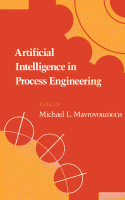Browse content
Table of contents
Actions for selected chapters
- Full text access
- Book chapterNo access
1 - Qualitative Modeling of Chemical Reaction Systems
D.T. DALLE MOLLE and T.F. EDGAR
Pages 1-36 - Book chapterNo access
2 - Use of Qualitative Models in Discrete Event Simulation to Analyze Malfunctions in Processing Systems
JANE T. MALIN, BRYAN D. BASHAM and RICHARD A. HARRIS
Pages 37-79 - Book chapterNo access
3 - An Expert System for Diagnosis of a Sequential, PLC-Controlled Operation
DOUGLAS R. MYERS, JAMES F. DAVIS and CHARLES E. HURLEY
Pages 81-122 - Book chapterNo access
4 - Fault Detection and Diagnosis Using Artificial Neural Networks
JOSIAH C. HOSKINS and DAVID M. HIMMELBLAU
Pages 123-160 - Book chapterNo access
5 - A Modular Approach to Multiple Faults Diagnosis
EDUARDO MORALES and HECTOR GARCIA
Pages 161-187 - Book chapterNo access
6 - Modeling Real-World Processes: Deep and Shallow Knowledge Integrated with Approximate Reasoning in a Diagnostic Expert System
A. D'AMBROSIO
Pages 189-221 - Book chapterNo access
7 - XIMKON—An Expert Simulation and Control Program
A. FERIT KONAR, BHAVANI M. THURAISINGHAM and PAUL E. FELIX
Pages 223-265 - Book chapterNo access
8 - Exothermic Batch Chemical Reactor Automation via Expert System
DANIEL R. LEWIN and RAM LAVIE
Pages 267-294 - Book chapterNo access
9 - Design of Protein Purification Processes by Heuristic Search
CHARLES A. SILETTI
Pages 295-310 - Book chapterNo access
10 - An Adaptive Heuristic-Based System for Synthesis of Complex Separation Sequences
Y.W. HUANG and L.T. FAN
Pages 311-361 - Book chapterNo access
Index
Pages 363-367
About the book
Description
Artificial Intelligence in Process Engineering aims to present a diverse sample of Artificial Intelligence (AI) applications in process engineering. The book contains contributions, selected by the editors based on educational value and diversity of AI methods and process engineering application domains. Topics discussed in the text include the use of qualitative reasoning for modeling and simulation of chemical systems; the use of qualitative models in discrete event simulation to analyze malfunctions in processing systems; and the diagnosis of faults in processes that are controlled by Programmable Logic Controllers. There are also debates on the issue of quantitative versus qualitative information. The control of batch processes, a design of a system that synthesizes bioseparation processes, and process design in the domain of chemical (rather than biochemical) systems are likewise covered in the text. This publication will be of value to industrial engineers and process engineers and researchers.
Artificial Intelligence in Process Engineering aims to present a diverse sample of Artificial Intelligence (AI) applications in process engineering. The book contains contributions, selected by the editors based on educational value and diversity of AI methods and process engineering application domains. Topics discussed in the text include the use of qualitative reasoning for modeling and simulation of chemical systems; the use of qualitative models in discrete event simulation to analyze malfunctions in processing systems; and the diagnosis of faults in processes that are controlled by Programmable Logic Controllers. There are also debates on the issue of quantitative versus qualitative information. The control of batch processes, a design of a system that synthesizes bioseparation processes, and process design in the domain of chemical (rather than biochemical) systems are likewise covered in the text. This publication will be of value to industrial engineers and process engineers and researchers.
Details
ISBN
978-0-12-480575-0
Language
English
Published
1990
Copyright
Copyright © 1990 Elsevier Inc. All rights reserved.
Imprint
Academic Press
